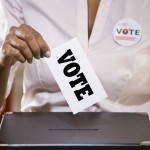 Facing multiple disruptions like losing a job, being evicted, or losing health insurance makes people less likely to vote. But these hardships may push them to engage in other political activities, says a new study from Cornell.
Facing multiple disruptions like losing a job, being evicted, or losing health insurance makes people less likely to vote. But these hardships may push them to engage in other political activities, says a new study from Cornell.
By analyzing large surveys of verified American voters before and during the pandemic, the researchers found that people with unstable lives are less likely to vote, except during highly politicized crises like COVID-19, which can increase turnout.
Reducing turnout
The data revealed that those experiencing the most personal crises are almost 20 percentage points less likely to vote compared to those with no crises. This gap is almost as big as the turnout difference between white and Hispanic voters. Yet, the same challenges might drive people to other political actions, like contacting elected officials or attending community meetings and protests.
“When people link their problems to direct political actions that might help, crises can actually boost political participation,” the authors explain. “Crises don’t necessarily lead to deeper political alienation for marginalized people.”
The authors argue that personal life is deeply political, and many crises are caused by economic changes and growing inequality, which increase risks for those with fewer resources.
Previous studies have looked at how single disruptions affect political participation—like foreclosure or arrest. But after successive crises in the U.S. housing, labor, and healthcare markets, this study gives a more comprehensive view.
“If we only consider one crisis at a time, we’ll miss the larger connection between our economic environment and democracy—the political choices people make or don’t make,” the researchers say. “We need to look at these crises together to understand what many people are experiencing: multiple crises over time.”
Life disruptions
The study used publicly available data from the Cooperative Election Study (CES) in 2018 and 2020, which included over 60,000 respondents, plus additional questions to a nationally representative sample of 1,000. They also used data from the Democracy Fund’s Views of the Electorate Research (VOTER) Survey.
The surveys validated turnout with public records and asked about other activities, like attending political meetings, putting up political signs, working for a campaign, attending protests, contacting officials, and donating money. Respondents also reported if they experienced any of several dozen crises in the past year, from divorce and medical bill trouble to losing jobs, homes, or health insurance.
As expected, after controlling for income, race, and other factors, the analysis showed more crises reduced the likelihood of voting. A suspended or revoked driver’s license was the disruption most strongly linked to lower turnout, followed by repossession of belongings, eviction, and home loss.
“These findings suggest that the overall impact of life disruptions can significantly lower turnout,” the authors wrote.
A fine line
This wasn’t true for COVID-related crises, where cumulative problems were linked to higher turnout. People respond differently to highly politicized issues that are covered heavily in the news with clear political messages.
While crises can prompt activism instead of voting, the surveys found this type of participation much less common. For example, non-voting activity reported in the 2020 CES ranged from 3% working for a campaign to 23% donating money, while voter turnout was 62%.
Overall, the study highlights the importance of considering life disruptions when studying political behavior, offering elected officials and advocacy groups a more comprehensive and nuanced understanding of when people will engage politically and what kinds of political action they are likely to take.
“Choices about how to provide resources to constituents or not affect whether they engage the political process,” the authors conclude. “It clarifies the stakes of larger decisions about how to structure the economy and meet people’s needs in challenging times. That very much matters for the nature and the content of our democracy.”